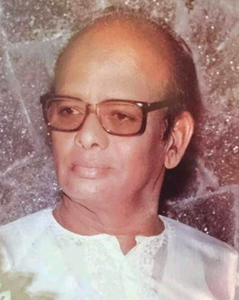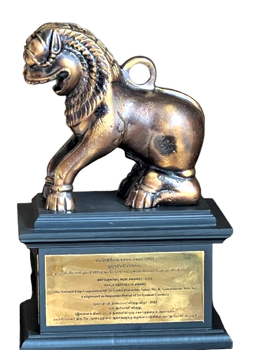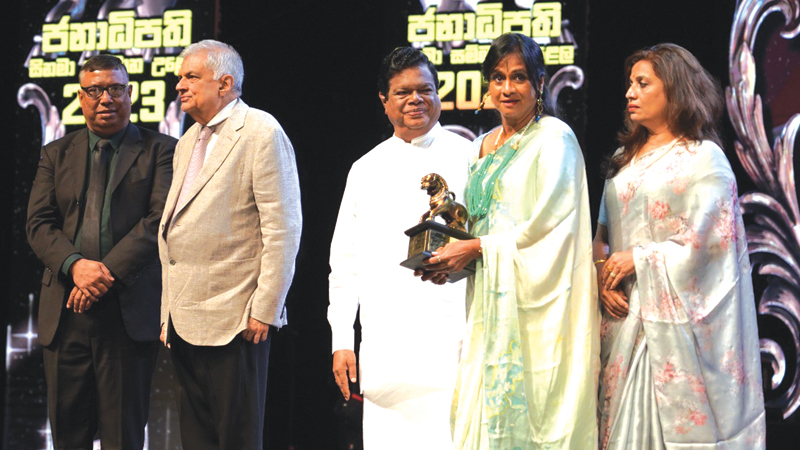For the first time in the history of the Presidential Film Awards that began in 1979, a special award named Yugabhimani was introduced this year to recognise pioneering film producers who have made significant contributions to the development of cinema in the country. In this landmark instance, the award was bestowed posthumously upon K. Gunaratnam, a renowned and influential film producer.
The prestigious Yugabhimani Award was conferred by President Ranil Wickremesinghe on K. Gunaratnam’s daughters, Priya King Gunaratnam and Vijaya Gunaratnam.
 The daughters extended their gratitude to Dr. Bandula Gunawardena, the Minister of Transport, Highways and Mass Media, and National Film Corporation (NFC) Chairman, Attorney-at-Law Deepal Chandraratne, for dedicating this esteemed award to their late father.
The daughters extended their gratitude to Dr. Bandula Gunawardena, the Minister of Transport, Highways and Mass Media, and National Film Corporation (NFC) Chairman, Attorney-at-Law Deepal Chandraratne, for dedicating this esteemed award to their late father.
They expressed their deep gratitude for the award bestowed upon their father, K. Gunaratnam, who was at risk of being forgotten in history. This recognition stands as the first national appreciation for his significant contributions to the local film industry.
Pioneering a new direction for the local film industry and transforming it into a modern and competitive business model, Kanagasabai Gunaratnam’s Cinemas Ltd. was founded in 1947.
Originating from the northern part of Sri Lanka, he was the third individual to enter the Sri Lankan film industry, significantly shaping the popular design style of Sri Lankan cinema after his entry into the business.
 He was the first to venture into Sinhalese dubbing for the movie Gurhi Pravesham, titled Mana Priyatnaya. Subsequently, he entered film production after initially engaging in importing films and later acquiring several theatres. Gunaratnam’s first imported Tamil film, Valgei, achieved huge success, solidifying his position in the local film industry.
He was the first to venture into Sinhalese dubbing for the movie Gurhi Pravesham, titled Mana Priyatnaya. Subsequently, he entered film production after initially engaging in importing films and later acquiring several theatres. Gunaratnam’s first imported Tamil film, Valgei, achieved huge success, solidifying his position in the local film industry.
Challenging the monotony of the existing film industry, Gunaratnam entered the distribution of Sinhala films in 1950 with the release of the film Hadisi Vinishchaya, directly competing in the local film scene.
Subsequently, he designated the National Theatre in Maradana as a key venue for screening Sinhala films, naming it Gamini, expressing high expectations for the local cinema movement. Although the beloved “Gamini Hall” was destroyed during the 1983 riots, people still call the area “Gamini Hall” junction.
In 1951, Gunaratnam successfully established a film exhibition board with a designated set of theatres in Sri Lanka, premiering the film Seedevi for the first time at the Gamini Cinema.
Sujata
The groundbreaking film Sujata, produced in 1953, marked a turning point in the history of popular local cinema, introducing numerous innovative concepts not previously seen in Sri Lankan film production.
By rejecting the tradition of making stage dramas into films, he created a tradition of entertaining films, adding Prem Jayanth and Florida Jayalath to lead roles, and created the concept of movie stars and the first trailers and movie styles in Sujata.
 Thereafter he produced a series of films including, Warada Kageda, Radala Piliruwa, Dosthara, Duppathage Duka, Suraya, Vana Mohini, Sandeshaya, Veera Vijaya, Apsara, Ataweni Pudumaya, Allapu Gedara and many others.
Thereafter he produced a series of films including, Warada Kageda, Radala Piliruwa, Dosthara, Duppathage Duka, Suraya, Vana Mohini, Sandeshaya, Veera Vijaya, Apsara, Ataweni Pudumaya, Allapu Gedara and many others.
In 1961, he established the Hendala Vijaya Studio, creating a comprehensive movie studio in South Asia that rivaled the ones in India.
The laboratory at the studio was recognised as one of the best black-and-white laboratories in Asia.
Gunaratnam introduced numerous film stars in his productions, including Kanthi Gunatunga, Alfred Edirimanna, Sandhya Kumari, Jeevarani Kurukulasuriya, Vijitha Mallika and Veena Jayakody.
He played a significant role in elevating cinematic icon Gamini Fonseka and Joe Abeywickrama to the status of leading film stars through his films.
Gunaratnam stood out as the sole Sri Lankan film entrepreneur recognised as a professional film producer. He meticulously orchestrated all aspects of film production, from scriptwriting to screening.
His commitment to quality was evident in his practice: if he wasn’t contented with a product, he refrained from showcasing it until it met his rigorous standards.
Gunaratnam held ownership of several theatres, including Colombo Gamini, Lido, Sapphire, Kingsley, Capitol, Raj, and Vijaya.
Some of these cinemas still exist despite the downturn in the industry.
Golden era
Gunaratnam, the visionary behind the golden era of Sri Lankan cinema, left an indelible mark on all aspects of film production, exhibition, distribution, import, and studios.
Born on July 30, 1917, he departed this world under tragic circumstances on August 9, 1989 at the age of 72. He will always be remembered for his contribution to local cinema.






